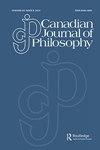The Contents of Imagination
IF 1.7
2区 哲学
0 PHILOSOPHY
引用次数: 0
Abstract
Abstract Our imaginings seem to be similar to our perceiving and remembering episodes in that they all represent something. They all seem to have content. But what exactly is the structure and the source of the content of our imaginings? In this paper, I put forward an account of imaginative content. The main tenet of this account is that, when a subject tries to imagine a state of affairs by having some experience, their imagining has a counterfactual content. What the subject imagines is that perceiving the state of affairs would be, for them, like having that experience. I discuss three alternative views of imaginative content, and argue that none of them can account for two types of error in imagination. The proposed view, I suggest, can account for both types of error while, at the same time, preserving some intuitions which seem to motivate the alternative views.想象的内容
我们的想象似乎与我们的感知和记忆事件相似,因为它们都代表着一些东西。它们似乎都有内容。但是,我们想象内容的结构和来源究竟是什么呢?在本文中,我提出了一种想象内容的描述。这种说法的主要原则是,当一个主体试图通过某些经验来想象一种事态时,他们的想象就具有反事实的内容。主体想象的是感知事物的状态,对他们来说,就像拥有那样的经历。我讨论了关于想象内容的三种不同观点,并认为它们都不能解释想象中的两种错误。我认为,所提出的观点可以解释这两种类型的错误,同时,保留了一些似乎激发了其他观点的直觉。
本文章由计算机程序翻译,如有差异,请以英文原文为准。
求助全文
约1分钟内获得全文
求助全文

 求助内容:
求助内容: 应助结果提醒方式:
应助结果提醒方式:


